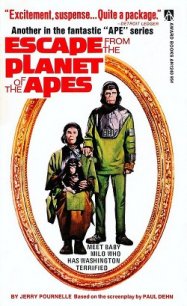Conquest of the Planet of the Apes - Jakes John (читать книги онлайн полностью txt) 📗
He dashed from spot to spot, cheering them on. Something deep within him responded with a thrill to their chilling, blood-crazed yells. All around the plaza, fires burned . . .
A shop window smashed with swung shackles permitted two orangutans to arm themselves with a brace of razors each. More broken glass allowed a group of gorillas to strip a gunsmith’s of pistols and ammunition. By now, the unclothed apes who had marched with Caesar were all but completely mingled with the garbed slave apes—and all were united by their common purpose.
Caesar dashed by a restaurant, responded to a hail—and saw the chimpanzee busboy inside. The grinning chimp ignited a chafing dish, then scattered its flaming contents to set the restaurant ablaze before returning to the street, a cleaver winking in his right hand.
With a force now three times as large as that with which he’d begun, Caesar stormed deeper into the city. Dozens of fires had been started. The sounds of carnage echoed along every street.
Still, he was fully aware that resistance thus far had been relatively light. The greatest concentration, he was sure, would lie ahead, near the Civic Center, as those in power prepared to defend the focal point of their control.
Down cross-avenues he glimpsed the revolving lights of emergency fire vehicles, permitted above ground to try to quench the innumerable conflagrations. He deployed clothed and naked apes down these side streets in groups of ten or twenty, with instructions to harass the firemen, then converge upon the Civic Center from all sides.
Safely back in the Command Post, Governor Breck glanced from monitor to monitor, his face shiny with perspiration. The scenes on the monitors trained on the plaza overhead distressed him most. He saw miniature parks afire, shadowy anthropoid figures flitting back and forth through the gloom.
Reports said that rebellious city apes had now joined the invading force. In minutes, the situation had grown extremely precarious.
And he had let it happen.
An assistant slammed down a phone. “Mr. Governor? The main forces are forming up to repel them three blocks from here.”
The Governor leaned forward to twist up a volume control. “Forming up! We should be hearing gunfire right now!”
In the dimness, MacDonald turned away. Breck was beginning to sound like a man whose control was slipping.
SEVENTEEN
The ape army surged forward along the boulevard like some hallucinatory reverse image of a human fighting force. They carried human weapons, but there the resemblance ended. This army shambled and snapped, growled and slavered.
Caesar operated from the protective cover of the third or fourth rank, repeatedly pulling out small groups while the larger mass rolled ahead. He sent these smaller strike forces hurrying down side streets to seek entrances to the service tunnels; their orders were to come up from the tunnels as close to the Civic Center as possible. He knew that many of the apes would get lost in the mazes below the city, but if even a few got through, the tactic would strengthen his attack, and this surprise force striking from the rear might very well be needed to overcome the next, highly formidable barrier just two blocks distant.
Again the apes confronted cordons of men stretched across the boulevard. But now the humans carried more weaponry—ranging from riot sticks and shields to rifles. The vehicles ranked behind the double row of men were not the vans and fire pumpers of the first barricade, but heavily armored police equipment. Slots replaced windows. Top turrets bristled with the muzzles of mini-cannon.
Calling a last word of encouragement, Caesar ran to the right side of the street. He dodged behind the concrete rail of a walkway and scuttled up the incline to the second level, Where he could watch the engagement like a general from a hilltop vantage point.
The turrets of the armored vehicles revolved until all the muzzles pointed at the advancing apes. The rifles and pistols of men in the front ranks poked out between riot shields. Abruptly, the apes in the van recognized the threat, slowed their pace.
With perhaps fifty yards separating the apes and the humans, a helmeted officer brought a megaphone up to his mouth.
“No! NO!”
Like thunder, the command pealed away down the boulevard. For perhaps five seconds, the command conditioned reflex brought the apes in the front ranks to a dead halt.
Others crowded up behind them, progress blocked. Caesar knew an instant of hopelessness. Then his nerve returned. He gripped the edge of the parapet, started to stand up in full view to exhort the confused, hesitant apes . . .
A sound stopped him. The beginning of a wild, collective gibbering among the animals that grew louder, more mocking by the second. Joyfully, Caesar realized that the conditioning had ultimately failed. Ape intelligence had triumphed over gut fear.
Louder and louder the apes gibbered, as the front ranks began a shuffling advance.
The officer with the megaphone tried one last time: “Home! Go home, all—”
A rock whizzed toward him. He ducked behind the barricade of shields, his shouted orders all but drowned out by the massed howling of the apes.
Chunks of debris flew. A gorilla fired a pistol. The report triggered a screaming animal charge. They know we can win! Caesar thought, exulting. The first rank of foot police advanced to join the battle. A moment later, apes and police melted together into a furious melee.
Then Caesar realized the humans were still committing a tactical error. In their false belief in their own superiority, they were convinced that they could subdue this uprising without massive firepower. The police used their sticks mostly, with only occasional shots fired when an officer found himself seriously threatened.
But riot sticks were virtually useless against giant gorillas, who towered over the humans, their heads well up out of harm’s reach. Caesar watched gorillas pick up policemen bodily, wrench away their shields and sticks, then hug, strangle, fling, or trample the men into unconsciousness—or death.
One of the armored turrets began to chatter. Someone screamed a countermanding order when as many policemen as apes dropped under the withering fire.
Where the great stature of the gorillas helped overcome the riot policemen, the smaller size of the agile chimpanzees also carried an advantage. They could duck in beneath the stick-blows and shields to slash with their knives. Policemen fell with bellies ripped open. Caesar even saw one of the chimps leap onto the shoulders of hapless men, poised piggy-back a moment while knife hands plunged over and down to slash necks open from behind.
As the gorillas crushed and the chimps wielded their wicked blades, the orangutans darted in and out among the casualties, picking up whatever weapons the humans dropped. They unbuckled the gunbelts of the police, some orangutans draping themselves proudly with the captured equipment, others distributing the holsters and guns to members of the gorilla force—whose biggest members had already completely penetrated the police lines and were advancing toward the armored vehicles.
Still the armored turrets held their fire. Caesar could only thank some commander’s misguided humanity. At any moment the commander might give the order that would slay the apes and sacrifice his own men. But while the advantage lasted, the apes seized it—gorillas in the forefront, some already clambering up on the armored cars.
Just when it looked to Caesar that this inner defense line might be stormed, a new weapon was introduced from the boulevard’s opposite side. A panel sprang open in the side of an armored vehicle parked in semidarkness. From the compartment in the vehicle’s side, men began to unreel thick hoses.



